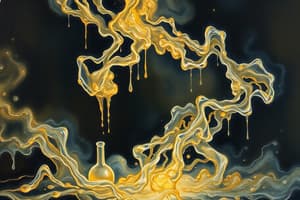Podcast
Questions and Answers
In which type of chemical reaction does a single substance break down into two or more simpler substances?
In which type of chemical reaction does a single substance break down into two or more simpler substances?
- Double displacement reaction
- Redox reaction
- Synthesis reaction
- Decomposition reaction (correct)
What factor typically increases the rate of chemical reactions by providing more collisions and energy between particles?
What factor typically increases the rate of chemical reactions by providing more collisions and energy between particles?
- Pressure
- Concentration
- Temperature (correct)
- Catalysts
Which factor leads to a faster reaction rate due to the increased frequency of collisions between particles?
Which factor leads to a faster reaction rate due to the increased frequency of collisions between particles?
- Equilibrium
- Activation energy
- Pressure (correct)
- Temperature
What type of chemical reaction involves two compounds exchanging their ions or atoms to form two new compounds?
What type of chemical reaction involves two compounds exchanging their ions or atoms to form two new compounds?
What are substances that speed up chemical reactions by lowering the activation energy required for a reaction to proceed known as?
What are substances that speed up chemical reactions by lowering the activation energy required for a reaction to proceed known as?
What happens in a synthesis reaction?
What happens in a synthesis reaction?
How are chemical reactions classified based on the nature of the change?
How are chemical reactions classified based on the nature of the change?
What does a balanced chemical equation show?
What does a balanced chemical equation show?
What do atoms do in a chemical reaction?
What do atoms do in a chemical reaction?
Which type of reaction involves the breakdown of existing substances?
Which type of reaction involves the breakdown of existing substances?
Flashcards are hidden until you start studying
Study Notes
Chemical Reactions: Unraveling the Building Blocks of Change
Chemical reactions are the foundation of chemistry, transforming one or more substances into different ones. They are fundamental to our daily lives, from cooking and cleaning to the inner workings of living organisms. In this exploration, we'll delve into the fascinating world of chemical reactions and the roles they play in chemistry.
The Basics of Chemical Reactions
In a chemical reaction, atoms form new bonds or break existing ones, leading to the formation of new substances. These reactions can be classified as synthesis or decomposition reactions, depending on whether new substances are formed or existing ones are broken down.
A chemical reaction can be represented by a balanced chemical equation, which shows the reactants (starting substances) and products (new substances) in their stoichiometric ratios. For example, in the synthesis reaction between hydrogen gas and oxygen gas to produce water, the balanced chemical equation looks like this:
[ 2 \text{ H}{2}(g) + \text{ O}{2}(g) \rightarrow 2 \text{ H}_{2}\text{O}(l) ]
This equation tells us that two molecules of hydrogen react with one molecule of oxygen to produce two molecules of water.
The Types of Chemical Reactions
Chemical reactions can also be classified based on the nature of the change. Some common types include:
-
Synthesis reactions (combination reactions): In these reactions, two or more simple substances combine to form a more complex substance.
-
Decomposition reactions (analysis reactions): In these reactions, a single substance breaks down into two or more simpler substances.
-
Single displacement reactions (single replacement reactions): In these reactions, an element in a compound exchanges places with another element to form two new substances.
-
Double displacement reactions (metathesis reactions): In these reactions, two compounds exchange their ions or atoms to form two new compounds.
-
Redox reactions: These reactions involve a transfer of electrons between substances. They are essential to understanding many chemical reactions, including combustion, corrosion, and oxidation-reduction reactions.
Factors Affecting Chemical Reactions
Chemical reactions are influenced by various factors, including:
-
Temperature: Higher temperatures typically increase the rate of chemical reactions by providing more collisions and energy between particles.
-
Pressure: For reactions involving gases, an increase in pressure can lead to an increase in reaction rate.
-
Concentration: An increase in the concentration of reactants can lead to a faster reaction rate, due to the increased frequency of collisions between particles.
-
Catalysts: Catalysts are substances that speed up chemical reactions by lowering the activation energy required for a reaction to proceed.
-
Activation energy: The energy needed for a reaction to occur.
-
Equilibrium: Many chemical reactions reach a steady state called equilibrium, where the rate of the forward reaction equals the rate of the reverse reaction.
Applications of Chemical Reactions
The study of chemical reactions has countless practical applications, including:
-
Manufacturing: Chemical reactions are used to produce a wide range of products, from everyday items like soap and detergents to high-tech materials like semiconductors.
-
Environmental applications: Chemical reactions play a vital role in purifying water, air, and soil, as well as in the destruction of pollutants.
-
Biochemistry: Chemical reactions form the basis of life processes, such as cellular respiration, photosynthesis, and DNA replication.
-
Medicine: Chemical reactions are involved in the synthesis of drugs and other pharmaceuticals, as well as in the body's metabolic processes.
-
Energy production: Chemical reactions can be harnessed to produce electricity, such as in fuel cells and batteries.
In conclusion, chemical reactions are the fundamental processes that shape our world. They are the building blocks of chemistry and have countless applications, from everyday life to groundbreaking technologies. Understanding chemical reactions and their factors and types is the first step to mastering the world of chemistry.
Studying That Suits You
Use AI to generate personalized quizzes and flashcards to suit your learning preferences.




